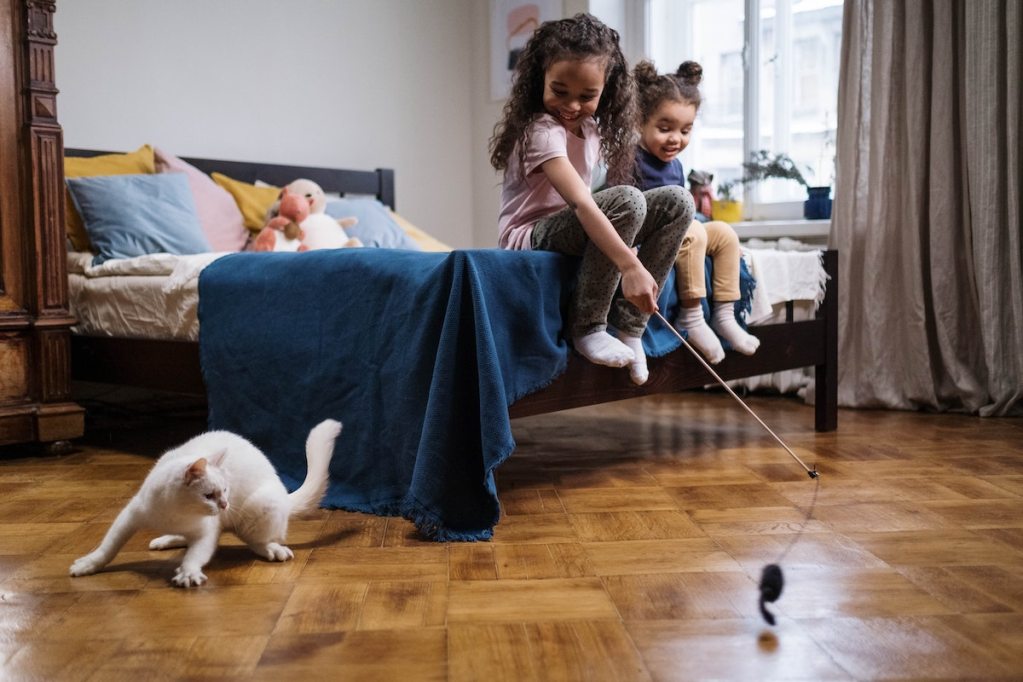Many a pet parent will attest: Cats love to go bump in the night. Whether it’s pawing at the automatic feeder, jumping off furniture, or getting a case of the zoomies, you’ve probably had a late-night scare or two when you thought you had an intruder, but it was actually a member of the household.
The level of nighttime activity might have you convinced that cats prefer to stay awake through all hours of the night and morning, but are cats nocturnal? We’ll break down what their weird behavior really means.
Are cats nocturnal?

The short answer is no. The longer answer involves breaking down mammals’ sleeping patterns. Humans are diurnal (mostly), meaning we stay awake during the day and sleep at night. That makes sense for the vast majority of us and our history (though some night owls might beg to differ on this one).
Interestingly, dogs, too, do most of their eating, hunting, and playing during the day and are also diurnal, but cats aren’t. So where does that put them? Kitties fall into a third category called crepuscular, which dictates that they’re most active at dawn and dusk. If that tracks for your household, now you’ll know why.
We think cats are nocturnal sometimes because they do much of their sleeping during daylight hours, just like a nocturnal animal, even though they have a slightly different schedule. This still means, though, that you might get a very early morning wake-up call when your cat hears their internal breakfast bell.
Why do cats sleep during the day?

Evolution, of course. Your feline’s wild ancestors developed very keen eyesight, especially in dim light, and used that to their advantage, which is still the case as some species, like lions, do this today. Hunting in dim light (but not during nighttime when it’s pitch black) gives them an advantage.
It also allows cats to sleep during the hottest part of the day to conserve energy and water in warm, dry climates. You’ll notice your modern mouser take full advantage of this when they curl up in a particularly scrumptious sunspot and absorb the sunshine, recharging their batteries for an evening of stalking their prey.
Top tips to manage your frisky feline

Even though the ancient instinct lives in their DNA, many pets manage to adapt to their humans’ schedules. That means they may have no problem waking during the day and then sleeping most of the night with you. If you find that your habits don’t quite sync up, try these tips to get your days and nights aligned.
Set aside playtime
As with any kid, furry or otherwise, the secret to a simple bedtime is to get their energy out before you both hit the hay. They might enjoy playing with a mouse on a string, fiddling with a Kong toy, or even trying their paw at a cat game on your phone. The goal here is both to bond and work their body and mind before bed.
Make sure they’re full
Have you ever had a particularly delicious meal and felt a little sleepy? It’s because your digestion works double time when you need to make it through a lot of extra food. Giving your four-legger a snack before bed could help them settle in for a long night of dreams.
Ignore them
Cats feed off attention. If they bug you enough, and you give in, you just taught them that their antics work. That won’t lead to sleep in the long term, even if it helps get you down for a few hours. After a couple of times, they’ll realize that their tricks don’t work and will give up, in theory at least.
Keep the bedroom closed
While sleeping with our pets has some real benefits, it doesn’t work for all humans or our fur babies. They may do best in a separate area of the house so you can get your full eight hours of sleep, and they can have their nighttime prowl to conjure up images of their forefathers.
Next time you hear your precious kitty up and about at 4 a.m., you’ll understand that they really can’t help it — that’s just the way they were made. While you might be able to get them on your schedule a bit, you should also make allowances for their crepuscular nature and give them extra bouts of attention when they’re most alert — in the morning and the evening. Hopefully, this all goes according to plan, and they don’t instead turn you into a half-nocturnal beast.




